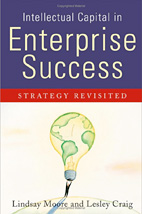Companies often fail to notice that their asset base has or is shifting from traditional tangible assets to an intangible asset base, and that concurrently, their approach to strategy and management must also change to effectively deploy and leverage the shifting asset mix.
Intangible assets, intellectual capital or property? It does make a difference
In modern discussions regarding the value of intellectual property, terminology can often become confusing. To prevent misunderstanding, it’s important to differentiate between “intangible assets,” “intellectual capital” and “intellectual property.”
The Strategic Positioning of Intangible Assets (PDF)
Patents, trademarks, copyrights and other intangibles are not worth anything if they sit in isolation. It requires individuals with vision and ability to understand their potential and to turn this into meaningful return by putting in place programmes that will maximise their value.
The Ethics of Intellectual Asset Management (PDF)
The shift from the familiar corporate asset base centered upon traditional physical and financial asset to an asset base centered upon intangible intellectual assets brings with it subtle new ethical challenges and problems.
Brand equity critical in firms’ valuation (PDF)
With the dawn of the Age of Intellectual Capital, during the mid ’90s, came the realization that the real wealth in the modern enterprise is located in the intangible assets of that enterprise—as opposed to the “traditional (tangible) assets” such as real estate, plant, equipment, inventory, cash and the like.
Building Market Capitalization With Intellectual Capital Assets
For every dollar of value contributed by tangible assets, two to four dollars more are being contributed to enterprise value by the intangibles. How can we make intangible assets, known as Intellectual Capital, actionable so we can use them to drive corporate valuation and stock price? Here is a simple way to think about the subject…
Non-Financial Performance Measurements
We are all well-acquainted with the traditional measures of enterprise performance. But today, under the influence of globalization, environmental crises, and widespread ethical breakdown there is pressure to identify and report new, non-traditional, and “non-financial” measures of performance to get at newly recognized dimensions of enterprise value, success, and significance. These new demands emerge from a belief that social, environmental, ethical, and geopolitical factors materially impact the ability of a company or enterprise to perform favorably.



 As the knowledge-based economy expands, the companies and individuals that possess intangible intellectual assets, such as intellectual property, will need specialized expertise, strategic thinking, legal experience, and the wisdom necessary to manage intellectual assets.
As the knowledge-based economy expands, the companies and individuals that possess intangible intellectual assets, such as intellectual property, will need specialized expertise, strategic thinking, legal experience, and the wisdom necessary to manage intellectual assets.